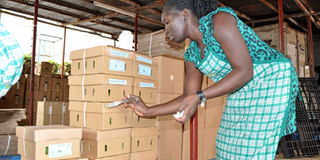E. Africa’s exports to EU edge up 8%

A woman packages vegetables and fruits for export. The European Union offers market for EAC products such as coffee, flowers, tobacco, tea, fish, vegetables and precious metal ores. File photo
What you need to know:
The region exported goods worth Shs9.6 trillion in 2017, Dorothy Nakaweesi writes.
The value of the region’s exports to European Union rose to $2.5 billion (Shs9.6 trillion) in 2017, increasing by eight per cent.
East Africa’s exports to the European Union shot up amidst trials to harmonise standards, the latest International Trade Centre (ITC) report has shown.
The region according to ITC, exported goods worth $2.5 billion (Shs9.6 trillion) in 2017, up from a $2.3 billion (Shs8.9 trillion) in 2016.
But the figure could have been better if member states quickly harmonised standards in the region.
Mr Jean Baptiste, the director Productive Sectors of the EAC speaking at the roundtable held in Arusha-Tanzania last week for businesswomen in the region, said: “To tap into the EU market, the region needs to benchmark standards with those in the European Union.”
In addition, East African products should “meet the requirements of the European consumers.”
For this to happen, member states must ratify the EAC Sanitary and Phytosanitary (SPS) protocol which addresses food and safety issues in the region.
Standards
The European Union offers market for EAC products such as coffee, flowers, tobacco, tea, fish, vegetables and precious metal ores, among others.
Ms Lillian Awinja, the executive director East African Business Council, in an interview with Prosper, said: “Harmonisation of standards in the region is urgently needed. We have taken the lead in advocating for the private sector in the region to increase intra-EAC trade, improve product quality and maintain competiveness in regional and international markets.”
Non-tariff barriers
The other challenges slowing down regional trade are non-tariff barriers (NTBs) which keep on cropping up and this impacts business negatively within the region and internationally.
Mr Dhaliwal Kake, former EABC board director and manager AVCO investment, said: “EABC efforts in advocating for the removal of Non-Tariff Barriers such as road blocks, improvement of the transport network in the region and simplification of border procedures has facilitated cross-border trade and improved the transport sector.”
Ms Arancha Gonzalez, executive director of International Trade Centre (ITC), urged the region to add value to products, align their products to international Sanitary and phytosanitary (SPS) measures, strengthen connectivity in all institutions that promote trade and maximise networks.
Gender factor
Ms Nancy Gitonga, East African Women in Business Platform (EAWiBP), the regional coordinator, emphasised the importance of linking women in business to different market opportunities.
“EAWiBP has successfully developed a contact database of 10,000 women in business in the EAC region,” Ms Gitonga noted.
“ITC has made trade more inclusive through the She Trade Programme by connecting together over one million women in business from different countries,” said Ms Gonzalez.




